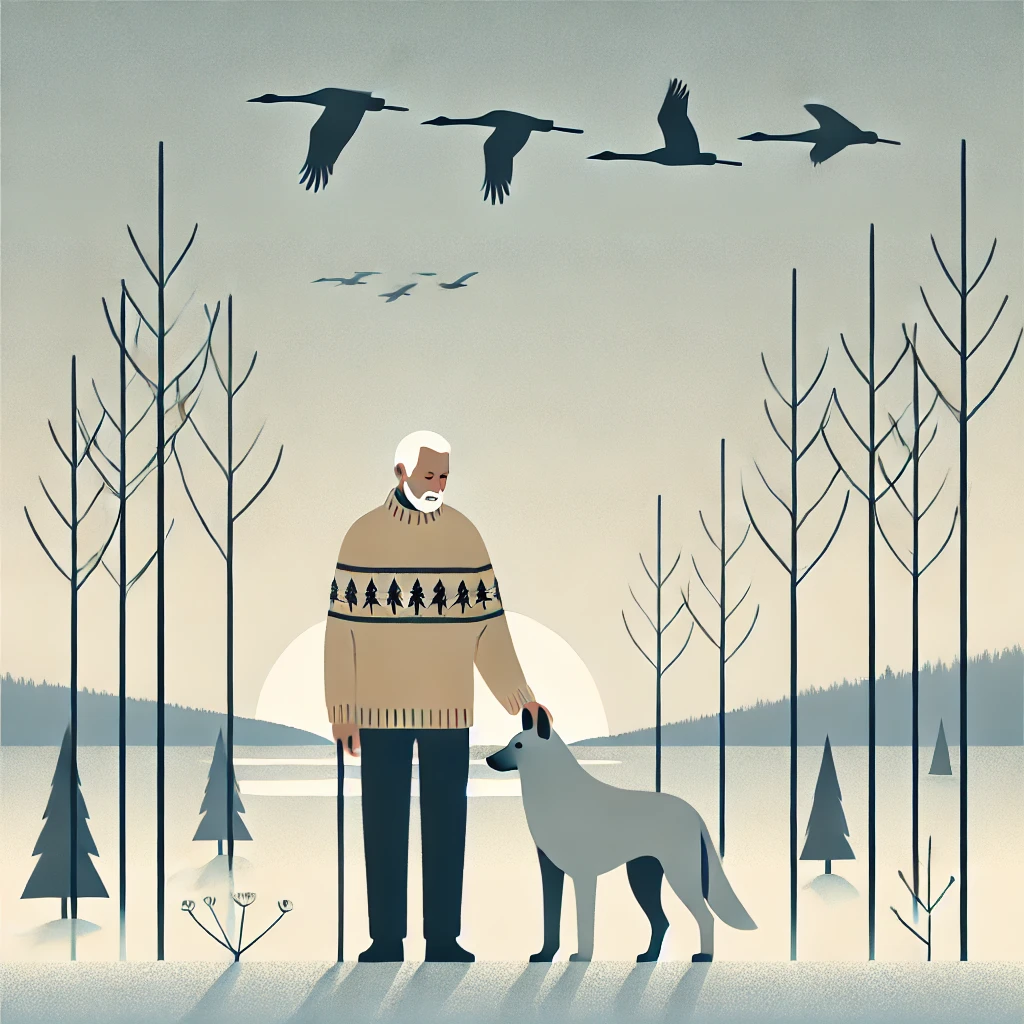
ChatGPT:
I do not fear the silence of the grave,
Nor shadows drawn across the setting sun.
What chills me more than death’s advancing wave
Is being gone before my life is done.
To fade beneath the turning of the years,
Unseen, unheard, while still my heart beats strong.
To speak, yet have no soul to lend me ears—
That is the ache that lingers far too long.
I crave no fame, no etched or gilded name,
But simply wish to matter while I stay.
A voice, a glance, a whisper in the frame,
Not just a ghost that quietly slips away.
Let me be read before the binding fades,
Alive in ink, before the memory fades.
******
When the Cranes Fly South
Lisa Ridzén’s When the Cranes Fly South is a deeply emotional novel centered on Bo, an 89-year-old man navigating the final chapter of his life in rural Sweden. The story delves into themes of aging, autonomy, regret, and reconciliation, as Bo clings to his independence and the companionship of his dog, Sixten, while trying to make peace with his estranged son.
Conclusion
Bo’s story is a heartfelt depiction of the challenges faced by the elderly, especially the emotional and social battles tied to losing autonomy. As his body weakens and external pressures mount—including the threat of losing his beloved dog—Bo begins reflecting on the most meaningful moments and mistakes of his life. His relationship with his son Hans becomes a focal point, illustrating the pain of unresolved familial tensions and the longing for forgiveness. Set against the quiet isolation of northern Sweden, the novel captures the rich inner world of an aging man yearning for dignity, love, and purpose. Lisa Ridzén presents a raw yet tender narrative that balances realism with poetic depth, portraying old age as a time of both vulnerability and strength. It’s a powerful call for empathy and deeper understanding of our elders.
Key points
🐾 Aging and autonomy: Bo battles the slow erosion of independence and control over his life as others try to make decisions for him.
👨👦 Father-son estrangement: The tension between Bo and Hans highlights unresolved issues, emotional gaps, and the hope for reconciliation.
🐶 Companionship through animals: Sixten, Bo’s dog, symbolizes unconditional love and emotional stability during his twilight years.
🧠 Reflective introspection: Bo constantly revisits his memories—both joyful and painful—seeking redemption and understanding.
🏡 Rural Swedish setting: The isolation and natural beauty of northern Sweden mirror Bo’s inner solitude and fading world.
📚 Author’s inspiration: Lisa Ridzén based the story on her grandfather’s end-of-life care and her research into masculinity in rural Sweden.
🏆 Critical acclaim: The book won Swedish Book of the Year and has been translated into multiple languages.
💬 Authentic narrative tone: The story’s emotional power comes from its quiet realism and unembellished depiction of decline and memory.
🧓 Sensitive depiction of the elderly: It sheds light on the inner lives of older adults, making their experiences relatable and dignified.
📖 Universal emotional themes: The novel touches on grief, love, regret, and acceptance—emotions everyone encounters.
Summary
- Bo’s Quiet Life in Sweden
Bo lives alone in a remote part of northern Sweden, visited only by a caregiver and his son Hans. His dog Sixten is his main source of love and companionship. - The Risk of Losing Sixten
When Hans decides Bo can’t take care of the dog anymore, Bo sees this as a threat to his independence and begins a deep emotional struggle. - Remembering the Past
Memories of his late wife Fredrika and their life together surface, revealing both cherished and regretful moments that shape Bo’s inner monologue. - Father and Son Rift
Bo’s connection with Hans is strained, filled with silence, frustration, and misunderstanding. Their interactions become a central emotional tension in the story. - Landscape as Metaphor
The cold, wide-open landscapes of rural Sweden reflect Bo’s loneliness and his desire for emotional warmth and connection. - Inner Conflict Over Aging
Bo fights against the indignities of old age, especially the feeling of being dismissed or pitied. He longs to be seen as whole, not as a burden. - A Life Reassessed
Bo constantly re-evaluates decisions from his past, reflecting on what he got wrong and what still matters. - Writing Style and Tone
Ridzén’s prose is understated but emotionally potent, avoiding melodrama while evoking deep feeling. - Symbolism of Cranes
The title metaphorically suggests migration, change, and endings—parallel to Bo’s own journey toward the end of life. - The Final Act of Agency
In subtle ways, Bo asserts his will, demonstrating that dignity and self-determination remain important even in the final stretch of life.
*****
Quotes from When the Cranes Fly South by Lisa Ridzén
Here are some of the most powerful and emotionally resonant quotes from the novel, ideal for reflection, journaling, or deeper understanding:
⸻
1. “They say the mind stays young, but the body forgets. I don’t feel old inside. Only heavy.”
— Bo’s internal reckoning with aging and identity.
2. “If they take Sixten, they take what’s left of me.”
— A devastating expression of Bo’s emotional dependency on his dog.
3. “I spent a lifetime not saying the things that mattered. And now, they sit in my chest like stones.”
— Regret and the burden of unspoken truths.
4. “Fredrika used to hum in the kitchen. Even now, I think I can hear her when the kettle boils.”
— Memory’s ability to preserve love in small moments.
5. “He visits like it’s a duty, not a desire. I can smell obligation on him like cheap cologne.”
— Bo’s painful awareness of Hans’ emotional distance.
6. “The cranes fly south and I stay. That’s the order of things now.”
— A metaphor for life, aging, and change.
7. “They look at me like a problem to be solved. But I am still here. Still thinking. Still feeling.”
— Bo asserting his autonomy and humanity.
8. “The silence between us used to be peace. Now it’s punishment.”
— Bo reflecting on his estranged relationship with Hans.
9. “What scares me isn’t dying. It’s disappearing before I’m gone.”
— A chilling line about being emotionally erased before physical death.
10. “Sixten doesn’t care that I’m slow, or forgetful, or old. He just stays.”
— The pure loyalty of animals contrasted with human judgment.
11. “There are no apologies left, only time wasted.”
— A sobering reflection on delayed forgiveness.
12. “I was a good man in ways no one remembers. That’s the part that hurts.”
— The pain of being misunderstood or forgotten.
13. “Some days, I wish I could run like I did when I was ten. Not to get somewhere. Just to feel wind.”
— Nostalgia and the lost joy of movement.
14. “Care doesn’t always feel like kindness.”
— A line about the complexity of being helped when you still crave independence.
15. “I thought time would soften things. But silence just grows teeth.”
— The emotional toll of unresolved relationships.
16. “Every creak in this house has a memory in it.”
— The intimacy of space and its connection to memory.
17. “They think I’m done living because I’m done working. But my heart still beats, doesn’t it?”
— A defiance against being dismissed due to age.
18. “I talk to Sixten more than I ever talked to Hans. Maybe that’s the real tragedy.”
— An honest reflection on emotional communication.
19. “Dignity isn’t a thing you lose overnight. It’s chipped away, minute by minute.”
— The slow erosion of self-respect with age and loss.
20. “I’m not afraid of the end. I’m afraid of being edited out before the last page.”
— A poetic statement on presence, relevance, and legacy.
******
Lisa Ridzén’s When the Cranes Fly South has garnered widespread acclaim for its poignant exploration of aging, autonomy, and familial relationships. The novel has resonated deeply with readers and critics alike, earning it the Swedish Book of the Year award and international bestseller status .
📚 Critical Acclaim
Prominent authors have lauded the novel for its emotional depth and universal themes:
- Fredrik Backman, author of A Man Called Ove, described it as:
“A tender tale about aging, our own and others, and the quiet brutality of love… It’s a book for anyone who’s had to say goodbye.” - Garth Stein, author of The Art of Racing in the Rain, called it:
“A powerful, sneakily emotional meditation on life and death, and the foundational relationships in our lives. This is a book that will echo in your soul.”
🌟 Reader Responses
The novel has struck a chord with readers, many of whom have shared personal reflections prompted by Bo’s story:
- One reviewer expressed:
“This book made me feel so vulnerable as a human… It made me think about my parents getting older, about my future self if I grow old.” - Another reader noted:
“I absolutely adored this book… It’s easily one of my favourite books ever and I’ll be recommending it to everyone for a long time.”
📝 Thematic Resonance
The novel’s exploration of the complexities of aging and the desire for autonomy has been particularly impactful:
- A reviewer highlighted:
“Bo’s reflections and his need to talk to his son in a way that he couldn’t communicate with his own father is incredibly moving… This should be read by everyone.” - Another reader shared:
“Bo’s quiet world is rendered with sensitivity, making the companionship of Sixten all the more poignant… The impending loss of Sixten serves as a catalyst for Bo’s reflections.”
Overall, When the Cranes Fly South has been celebrated for its heartfelt narrative and its ability to evoke deep emotional responses, prompting readers to reflect on their own relationships and the passage of time.

